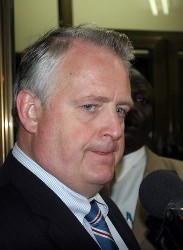US calls on Sudan to change its behavior to normalize ties
June 26, 2008 (WASHINGTON) — The Sudanese government needs to change its behavior and cooperate with the international community, a senior US official said today.

The decision by the US administration was made after the North Koreans agreed to provide information on its nuclear program.
“We call the attention of the government of Sudan to the steps taken by [North Korea] today” Williamson said
“The government of Sudan can also make this same determination to work with the international community by changing its behavior and working with the United Nations and its partners for the betterment of the people of Sudan” he added.
This is the first time Williamson offers a glimpse into the outcome of normalization talks with Sudan which were abruptly suspended earlier this month.
The US special envoy told reporters in Khartoum that he failed to bridge differences between the ruling National Congress Party (NCP) and Sudan People Liberation Movement (SPLM) over the oil rich region of Abyei and flew back home.
“Until North and South Sudan wanted peace there’s nothing the United States or others can do”.
“Right now our talks [normalization] are suspended” he added.
However the US official did not provide an update on the progress of talks regarding Darfur which was believed to be the main focus of the negotiations with the Sudanese government, particularly the deployment of peacekeepers in the war ravaged region.
The Sudanese UN ambassador Abdel-Mahmood Abdel-Haleem responded to Williamson’s statements describing them to Reuters as “not helpful at all”.
“This statement exposes Williamson’s ignorance” Abdel-Haleem said.
“The situations are different. We have a very fruitful engagement with the international community, with the UN and the Security Council” he added.
Williamson said that Khartoum needs to take material steps before it could receive concessions in terms of political and economic relations with Washington.
The US envoy said that Washington would not take the word of governments “with a long trail of broken promises”.
But the Sudanese diplomat accused Williamson of undermining the Darfur peace process.
Abdel-Haleem said that “interference by people like Williamson will complicate the situation rather than helping it” he said.
He further said that Sudan’s engagement with the international community “has been spoiled by people like Williamson”.
Abdel-Haleem also said Williamson, a Republican, was trying to make Darfur an election year issue ahead of the U.S. presidential election in November.
Williamson’s remark cast doubts on the success of normalization dialogue rounds that started last February.
Sudan has appeared optimistic on normalizing ties with the US within a short period of time.
The Sudanese foreign minister Deng Alor told reporters after meeting with Williamson last February that he expects to normalize relations within 4-6 months.
The United States imposed comprehensive economic sanctions on Sudan in 1997 and included it on a list of state sponsors of terrorism. The US embassy in Khartoum does not have a full ambassadorial post.
The sanctions have been stiffened subsequently particular in May 2007 when US president Bush issued an executive order barring 31 companies controlled by Sudan from doing business in the U.S. financial system.
(ST)
Some information for this report provided by Reuters
